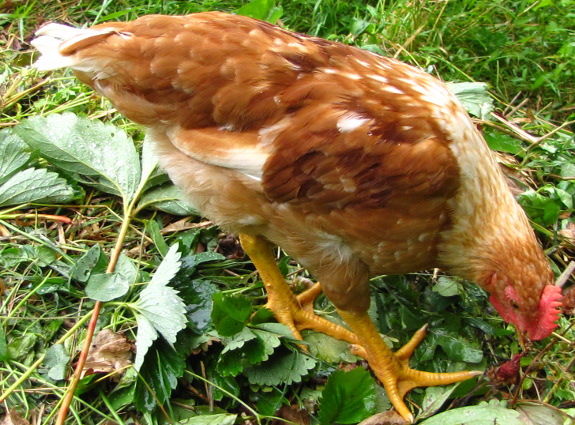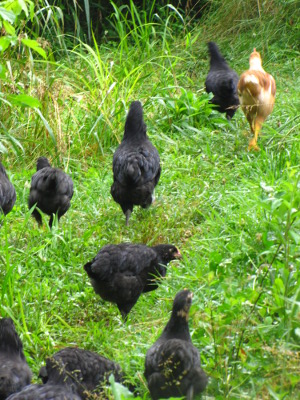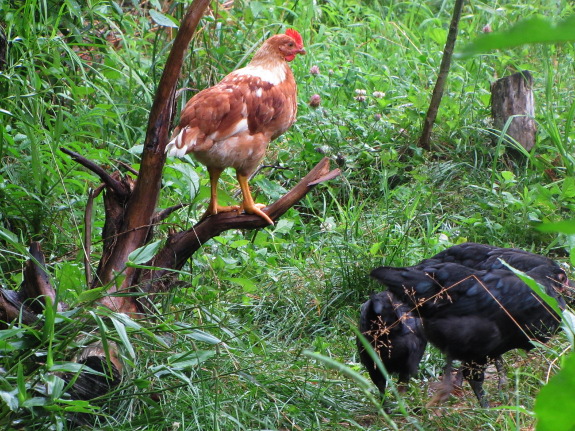
Raising light-weight chickens for meat

Last year, I keep track
of how
much I fed our dark cornish broilers compared to how much their dressed
carcasses weighed
and decided that it made the most sense to slaughter the birds at 12
weeks. Our tweens are just eight weeks old, so they've got
another month of grace (at least.)
 So far, our australorps (and
their golden comet leader) seem to be winning by a landslide over the
dark cornish when it comes to subsisting on found food. At three
months old, the dark cornish broilers had eaten 14 pounds of
storebought food apiece while our current tweens have only eaten 3.25
pounds of food apiece. I expect them to eat that much again over
the next month, but even that will put the current flock at less than
half the storebought feed costs of last year's broilers.
So far, our australorps (and
their golden comet leader) seem to be winning by a landslide over the
dark cornish when it comes to subsisting on found food. At three
months old, the dark cornish broilers had eaten 14 pounds of
storebought food apiece while our current tweens have only eaten 3.25
pounds of food apiece. I expect them to eat that much again over
the next month, but even that will put the current flock at less than
half the storebought feed costs of last year's broilers.
Which doesn't
necessarily mean the black australorps will be a better deal.
Since I'm currently raising light-weight egg-laying breeds rather than
heavy meat chickens, we could still end up with a feed to meat ratio
worse than that of our dark cornish. We also may need to grow our
current flock for an extra month to get them big enough to make it
worth our while to slaughter them, which might make the meat tougher.
Even though I'm
reserving judgment on whether my current meat chicken scheme makes
sense, I'm thoroughly pleased with our young flock. They go out
foraging in the rain, keep working through the heat of the afternoon,
and are generally a pleasure to look at. Thanks for the tip on
trying black australorps, Darren!

Want more in-depth information? Browse through our books.
Or explore more posts by date or by subject.
About us: Anna Hess and Mark Hamilton spent over a decade living self-sufficiently in the mountains of Virginia before moving north to start over from scratch in the foothills of Ohio. They've experimented with permaculture, no-till gardening, trailersteading, home-based microbusinesses and much more, writing about their adventures in both blogs and books.
Want to be notified when new comments are posted on this page? Click on the RSS button after you add a comment to subscribe to the comment feed, or simply check the box beside "email replies to me" while writing your comment.

Lisa --- You figured me out. Usually I think of what I want to say then take the pictures, but this time I had some pictures I wanted to share and had to come up with something to say about them.
To answer your question, the Golden Comet does seem to be taking on rooster responsibilities pretty early. He's got a harem of about three pullets who always seem to be with him, and the whole flock often follows his lead. Since he's the one who isn't afraid of me at all, he often leads them to good stuff.
Homemade Alaska --- I'm curious to hear more about how you "can't stand the unchicken like meat breeds." Which ones have you tried? What didn't you like about them? Are we talking taste or habit?
Anna, I'm talking habit, not taste. They taste just like the chicken we grew up eating. We have only grown the Cornish X, we are pretty limited here in what we can get, and this year with shipping issues and a hatchery in Anchorage almost out of business, it was far worse. So it was Cornish X again, or dual purpose, so we decided to try the dual purpose. We tried to tractor them, they don't forage (I've been told they will if put on pasture right away, but we did, and they still didn't forage), they will peck at things a little, but then spit it out and eat their food, gallons and gallons of food. Sit, eat, poo that is all they do all day. It was damaging my land, the incredible amount of poo they produce for the same amount of chickens as we had on pasture with the dual purpose. We tried to give them scraps, they won't eat them. They died off at incredible rates, I think by the end we had lost about 1/3 of what we started with. Fed organic feed, but had to give them medicated water to keep some of them from dying. I know someone who tried freedom rangers, which are supposed to be a more natural alternative, they do forage a bit better, but are so much like the Cornish X, she won't do them again either. Have you grown any specific meat breeds? If so what was your experience.
Gotcha. For some reason I initially parsed your first comment as meaning you didn't like the taste of their meat, but this makes much more sense.
We haven't grown Cornish Cross because of hearing too many stories like yours, but last year we did raise Dark Cornish, hoping for a better chicken with nearly as much meat. The results were very disappointing --- delicious meat, but the Dark Cornish barely foraged and ate even more feed than a Cornish Cross would have since we had to keep them longer to bring them up to weight.
I'll have to subscribe to your blog so that I'll be sure to hear how your dual purpose breeds do!